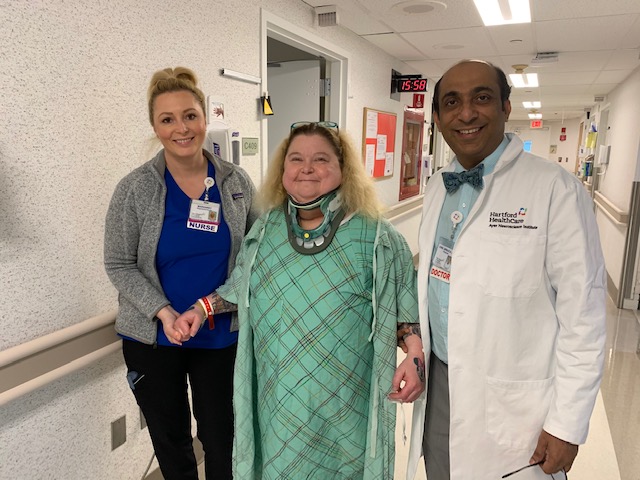Imagine waking up one morning and your body gives out. You fall to the floor, unable to move.
“It hit me real hard, it just scared me a lot,” said Tracey Zielinski of New Britain.
That’s the exact situation she found herself a few months back and ended up at the Hospital of Central Connecticut.
Zielinski says she was suffering from an acute severe compressive cervical myelopathy due to a large extruded cervical disk fragment, according to HOCC neurosurgeon Sunil Manjila. He says her spinal cord was significantly compressed.
“She was unable to move both legs except for a small flicker in her left toes,” Dr. Manjila said. “Her lower limb sensations were completely lost, ascending to the level of mid-chest.”
Zielinski had undergone a spinal infusion last year to help treat numbness in her arms and fingers. Fast-forward to March. There is now a new disk prolapse pushing on her spinal cord, which left her paralyzed.
“What’s going through my mind is that I’m a single mother and I have a 12 year old daughter who has a learning disability,” said Zielinski. “Now what do I do because of the living situation that I’m in.”
Dr. Manjila says her condition was due to a recent fall, which can happen to anyone. In order to reverse the effects of what was happening surgery was the best and only option. According to Dr. Manjila, Zielinski was progressing to what’s known as a Grade A classification from the American Spinal Injury Association (ASIA) — with the worst clinical prognosis. Once to that point, Dr. Manjila says there would’ve been no chance for recovery despite any intervention.
“So time is critical,” he said.
The same day Zielinski came into The Hospital of Central Connecticut’s Emergency Department, Dr. Manjila began operating on her in hopes of reversing the effects of the paralysis from the spinal cord compression.
“They go in through the front of the neck and they make the incision and then they do everything from the front to remove the pressure on the spinal cord from the bulging disk,” said Zielinski.
The surgery, which lasted into the early morning hours, was a success. Zielinski woke up from anesthesia regaining strength in both legs. A couple days later, Zielinski was up and walking with minimal help.
“With some residual sensory deficits expected, she should make most of her motor recovery,” says Dr. Manjila.
He also credits the staff in the emergency room and ICU with Zielinski’s care and recovery. All of which helped with the eventual outcome.
Zielinski has months of therapy ahead of her, but says she hopes to eventually get back to playing basketball, volleyball and softball one day — and thanks to the staff at HOCC in New Britain.
“I was definitely one of the lucky ones that I had all of this fall into place,” she said.”
Not feeling well? Call your healthcare provider for guidance and try to avoid going directly to an emergency department or urgent care center, as this could increase the chances of the disease spreading.
Need to see your doctor? New Patient? For more information about Hartford HealthCare virtual health visits, click here.
Click here to schedule a virtual visit with a Hartford HealthCare-GoHealth Urgent care provider.
Stay with Hartford HealthCare for everything you need to know about the coronavirus threat. Click here for information updated daily.
Questions? Call our 24-hour hotline (860.972.8100 or, toll-free, 833.621.0600).


